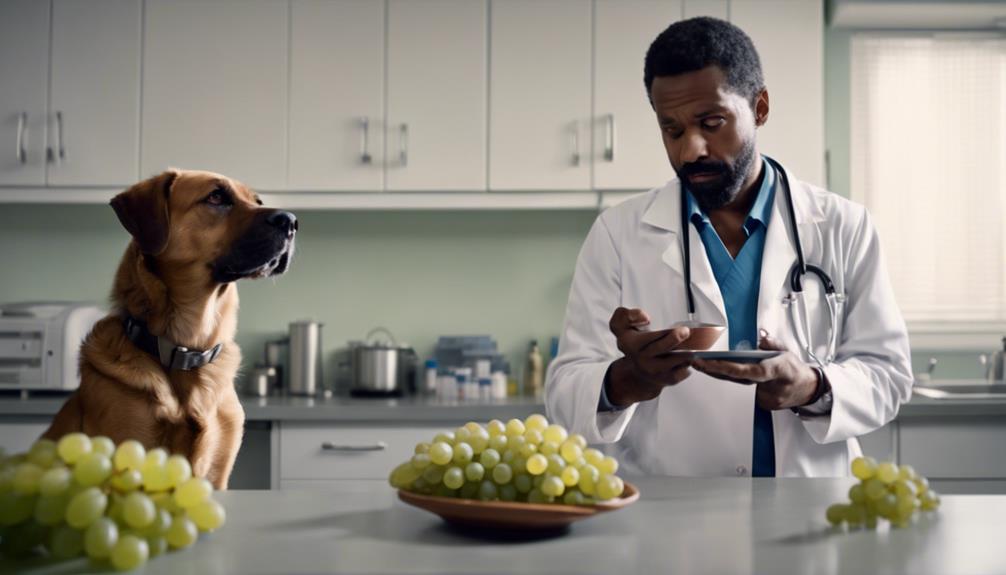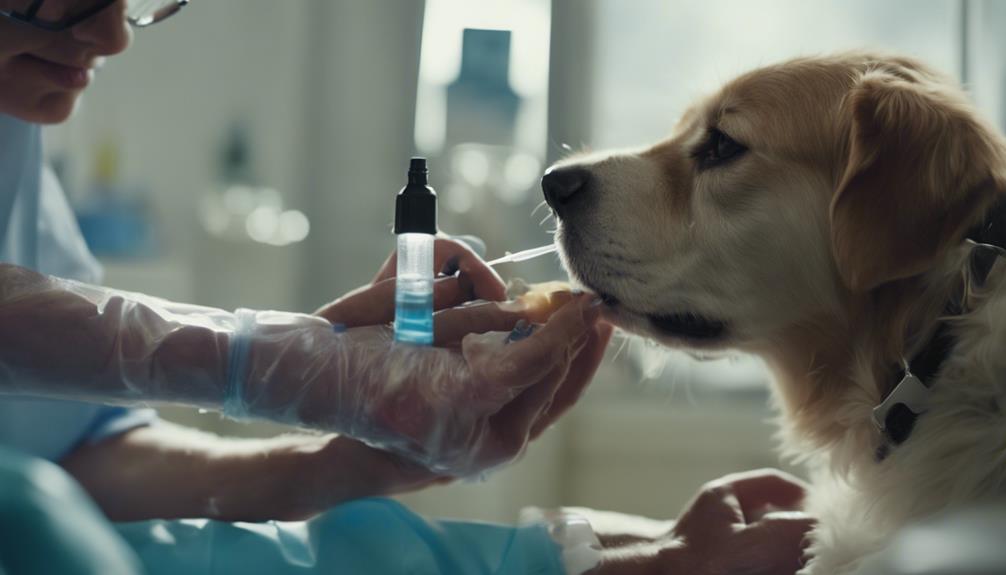In the realm of canine health, the consumption of grapes and raisins can have devastating consequences for our furry companions. The toxicity of these fruits, often underestimated by pet owners, can lead to severe kidney complications in dogs.
Understanding why grapes and raisins are so dangerous for dogs is paramount in ensuring the well-being of our four-legged friends.
Stay tuned to unravel the intricate details of this perilous interaction and discover the necessary precautions that every dog owner should be aware of to protect their beloved pets.
Key Takeaways
- Grapes and raisins are highly toxic to dogs, causing kidney failure.
- Immediate veterinary care is crucial if grape or raisin ingestion is suspected.
- Symptoms of grape poisoning include vomiting, lethargy, and abdominal pain.
- Inducing vomiting at home and seeking professional help are vital responses to grape ingestion.
Toxicity of Grapes and Raisins
Grapes and raisins pose a significant danger to dogs due to their potential toxicity, primarily linked to the presence of tartaric acid in these fruits. These common household fruits can lead to kidney failure in dogs, even in small amounts. All types of grapes and raisins should be strictly avoided, especially for smaller dog breeds that are more susceptible to the toxic effects.
Veterinarians consider grape or raisin ingestion a medical emergency and will aggressively treat any cases due to the serious health risks involved. Immediate action is crucial if your dog consumes these fruits to prevent severe complications such as kidney damage.
Following strict avoidance measures and seeking prompt veterinary care are essential to safeguard your pet's well-being.
Symptoms of Poisoning
The manifestation of poisoning from grapes and raisins in dogs often presents through a range of discernible symptoms. Common signs include loss of appetite, lethargy, and abdominal pain, which may be accompanied by vomiting or diarrhea shortly after ingestion.
Dehydration indicators such as panting, dry nose, and pale gums can also be observed. In severe cases, kidney failure may develop, manifesting as tremors, seizures, or comas.
Immediate action is crucial if poisoning is suspected, as prompt veterinary consultation is necessary to mitigate potential harm. Being vigilant for these symptoms and seeking professional help promptly can significantly impact the outcome in cases of grape or raisin ingestion by dogs.
Response to Ingestion

Upon suspecting grape or raisin ingestion by dogs, immediate action is imperative to address potential toxicity effectively. If such ingestion is suspected, veterinarians may recommend inducing vomiting at home to expel the fruits. Administering 3% hydrogen peroxide can aid in this process, but caution is necessary for breeds prone to breathing issues. Immediate veterinary care is crucial if other toxins are also suspected. It is essential to follow specific instructions tailored to your dog's needs for the best outcome.
| Action | Description |
|---|---|
| Inducing vomiting at home | Helps expel the fruits from the dog's system |
| Administering 3% hydrogen peroxide | Aids in inducing vomiting safely |
| Caution for breeds with breathing issues | Ensure safety during the vomiting process |
| Immediate veterinary care | Necessary if other toxins are suspected |
| Follow tailored instructions | Ensures the best outcome for your dog |
Veterinary Care After Ingestion
After suspected ingestion of grapes or raisins by dogs, prompt veterinary care is essential to address potential toxicity effectively. Seeking immediate professional assistance can make a significant difference in the outcome for the affected dog.
Here are some crucial steps that may be taken during veterinary care:
- Evaluation of the dog's current condition and symptoms.
- Administration of appropriate medications to counteract the toxicity.
- Monitoring of kidney function and overall health.
- Provision of supportive care such as intravenous fluids to maintain hydration levels.
These measures are vital in managing grape or raisin ingestion cases and ensuring the best possible outcome for the dog.
Inducing Vomiting at Home

Prompt action is crucial when considering inducing vomiting at home in response to grape or raisin ingestion by a dog. If your dog has ingested grapes or raisins, and your veterinarian recommends inducing vomiting, 3% hydrogen peroxide is commonly used for this purpose.
It is important to carefully follow the dosage instructions provided by your vet to avoid potential complications, especially in breeds prone to respiratory issues. While inducing vomiting may help expel the toxic fruits, it is essential to seek immediate veterinary care if other toxins are suspected or if your dog shows any concerning symptoms.
Always prioritize your dog's health and well-being by acting swiftly and consulting with a professional for tailored guidance.
Procedures for Treatment
In cases of grape or raisin ingestion by dogs, appropriate treatment procedures typically involve visiting a veterinary hospital for necessary interventions tailored to the individual dog's condition. When dealing with grape or raisin toxicity in dogs, the following procedures may be implemented:
- Immediate evaluation by a veterinarian is crucial.
- Diagnostic tests such as blood work may be performed.
- Treatment plans may include gastric decontamination methods.
- Monitoring for signs of kidney damage is essential.
These steps are vital to ensure timely and effective care for dogs that have ingested grapes or raisins, minimizing the risk of serious health complications.
Intravenous Fluids for Hydration

What role do intravenous fluids play in maintaining hydration levels during treatment for dogs who have ingested grapes or raisins?
Intravenous fluids are crucial in managing hydration for dogs affected by grape or raisin toxicity. These fluids help to counter dehydration, a common issue resulting from symptoms like vomiting and diarrhea. By administering fluids directly into the bloodstream, veterinarians can ensure rapid rehydration and support kidney function. This is particularly important in cases of grape or raisin ingestion, where kidney failure can be a severe complication.
Intravenous fluids also aid in flushing out toxins and maintaining electrolyte balance, promoting the dog's recovery process. Veterinary supervision is essential to monitor hydration levels and adjust fluid therapy as needed for optimal treatment outcomes.
Related Information
For further insights into safe dietary options for dogs, exploring fruits that are non-toxic can be beneficial. When considering your pet's diet, it's essential to be aware of what foods are safe for consumption.
Here are some related topics to expand your knowledge:
- Explore safe fruits for dogs to consume.
- Understand which human foods are safe for dogs.
- Learn what to do if you suspect your cat has been poisoned.
- Prevent xylitol poisoning in your dog.
Conclusion
In conclusion, the toxicity of grapes and raisins in dogs can lead to severe complications such as kidney failure. Recognizing the symptoms of ingestion and responding promptly are crucial for ensuring the well-being of our canine companions.
Veterinary care is essential after ingestion, including inducing vomiting and administering intravenous fluids for hydration.
By understanding the dangers these fruits pose, dog owners can take proactive measures to prevent accidental consumption and protect their pets from harm.




